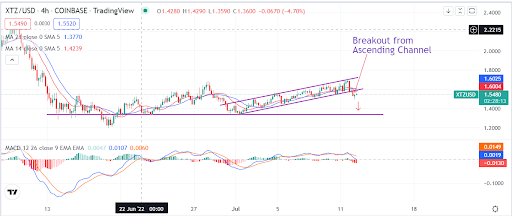Tezos token XTZ has been bullish this month.
The cryptocurrency has breached an ascending trendline and is going lower.
XTZ could fall up to $1.3 as weakness develops.
Tezos XTZ/USD has been bullish since the start of July. The cryptocurrency recovered from the $1.3 bottom on July 1, rising to a high of 1.7 on July 11. The crypto weakness has caused a 2% drop in Tezos in the last 24 hours.
Tezos prides itself on being an open-source platform. It seeks to address the barriers that face blockchain adoption for assets and applications. It achieves the goal by ensuring that Web3 is user-governed. Users can directly interface with one another over the network and interact with various applications. Its native token XTZ is used to pay for fees and for staking. It also acts as the basic accounting unit on the blockchain platform.
Whereas the XTZ token surged massively in 2021, it crashed this year. The token currently trades at $1.5, significantly below the high of above $9 in October 2021. Investors could again be looking for an opportunity to snap the token at the bottom. But is Tezos currently a buy?
Tezos bearish breakout is currently underway
 Source – TradingView
Source – TradingView
Technically, the MACD indicator is flashing a bearish market for Tezos. Previously, the cryptocurrency was trading in a system of higher highs and higher lows. Prices always recovered after hitting the 21-day moving average. However, with the recent weakness, Tezos broke below the ascending trendline and channel. It also trades below the 14-day and 21-day moving averages, which affirms the developing bearish move. We recommend a sell of Tezos as the price faces further declines. The cryptocurrency could proceed lower to touch the $1.3 support again.
Summary
Tezos is bearish after breaching an ascending trendline and channel. MACD indicators and moving averages are bearish. The cryptocurrency could fall back to $1.3.
The post What next as Tezos slips below a short-term trendline? appeared first on CoinJournal.










